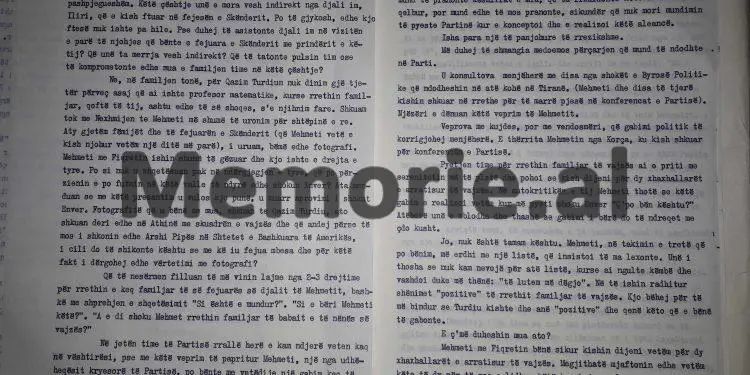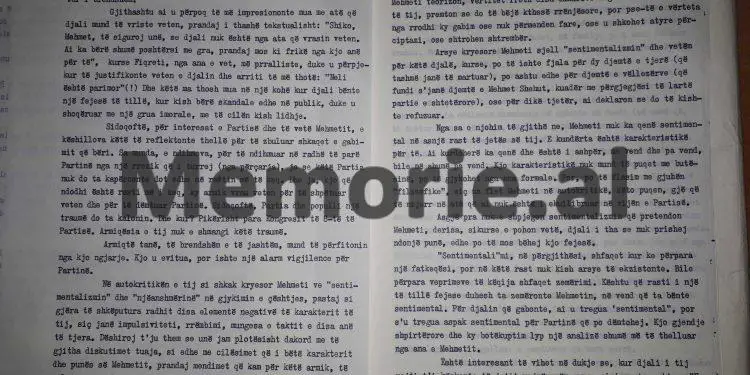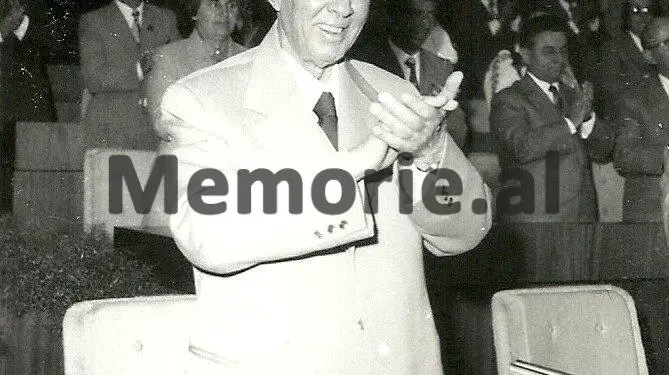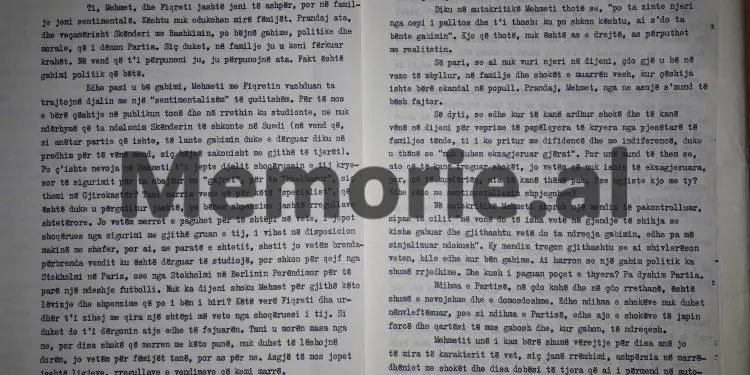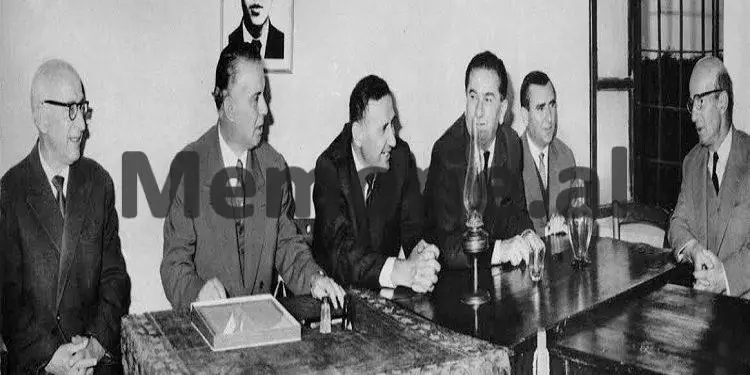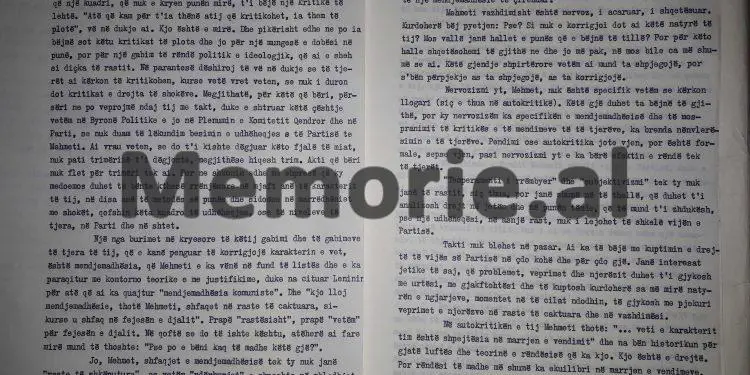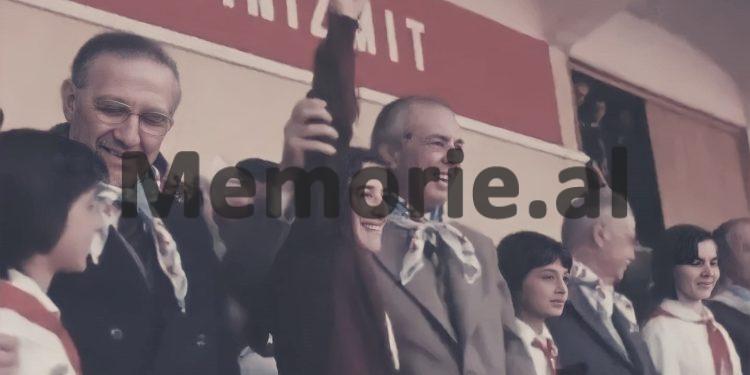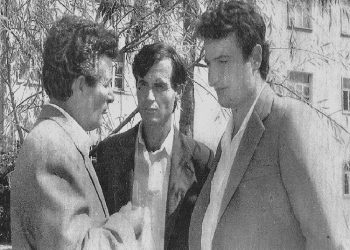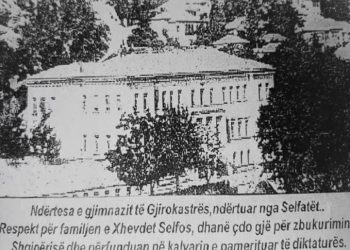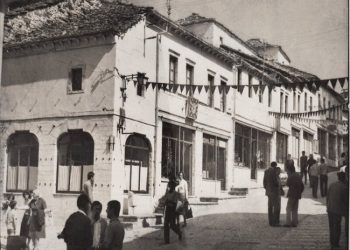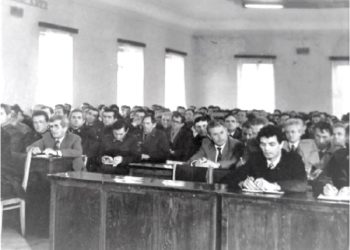Dashnor Kaloçi
Part forty-five
Memorie.al publishes some documents issued by the Central State Archive (fund of the former Central Committee of the ALP), where there is a voluminous file with archival materials which bear the logo ‘Top secret’, which belong to the period of years 1981-1982, with reports, reports, evidence, information, minutes of the meetings of the Politburo and the secretariat of the Central Committee of the ALP, etc., starting from what was held to review and analyze the self-criticism of the former Prime Minister Mehmet Shehu in December 1981, because he had allowed the engagement of his son, Skënder, “with a girl who had some political fugitives in her family circle”, the marathon meeting of the Politburo on the afternoon of December 17 his year that lasted until the late hours of that night, where that problem was discussed with the debates and discussions of all members who “crucified” former Prime Minister Shehu, the meeting of the morning of December 18, after the news that Prime Minister Mehme Shehu had killed himself, the marathon meeting of the Secretariat of the Central Committee of the ALP on September 20, 1982, with the topic: “Analysis of serious mistakes of Kadri Hazbiu, committed during the period when he was deputy minister and minister of Internal Affairs “, where Enver Hoxha initially launched accusations against Kadri Hazbiu, luring him as a” loyalist of the Party “, (in order for him to” open the heart of the Party “, speaking against former Prime Minister Mehmet Shehu) , where at the beginning of his speech, Enver said: “After the coup in the army, we discovered the traitorous group in economics of Abdyl Këllez, Koço Theodhos and Kiço Ngjela with friends. We also discovered this group here; it was not discovered by the State Security. The same can be said about the discovery of the group of Fadil Paçrami, Todi Lubonja and a number of other people connected with them, such as Ismail Kadareja with friends, the Security did not reveal, but that hostile work was discovered by the Committee Central, etc. ”! All these and other documents with the logo ‘Top secret’, will be published in several issues in a row, exclusively by Memorie.al.
Continued from the previous issue
Archival document ‘Top secret’ with the minutes of the meeting of the Politburo dated December 18, 1981, which took place without the presence of Prime Minister Mehmet Shehu, after a few hours ago, he was found dead in his room sleep!
ALBANIAN LABOR PARTY Secret
CENTRAL COMMITTEE
-General Sector-
PROCESS – VERBAL
OF THE MEETING OF THE POLITICAL BUREAU OF THE CENTRAL AFFAIRS OF THE ALP DATES
17 E 18 DECEMBER 1981
FIFTH SESSION
COMRADE ENVER HOXHA: We, in our family, knew nothing about Qazim Turdiu except that he was a professor of mathematics, and we did not know his family circle, both his and his wife’s, at all. We went with Nexhmija to Mehmeti, to wish him more for the new house. There we found Skënder’s children and fiancée (whom Mehmet himself had known the day before), congratulated them, and took pictures. Mehmeti and Fiqret were very happy and that was their right.
But how did they not worry a little in their conscience, that they were mixing and introducing comrade Enver in this filthy dance? They thought that with this presentation this work was sealed, the approval of Comrade Enver was obtained. The photos that were taken with me, went to Qazim Turdiu, they even went to Athens, with the girl’s team and, from there, why not go to Arshi Pipë in the United States of America, who would look like that with whom was the granddaughter engaged and, for this fact, was the photo certificate sent to her?
The next day, news started coming to me from 2-3 directions about the bad family circle of Mehmet’s son’s fiancée, along with the expression of concern “How is it possible”? “How did Mehmeti do this?” “Does comrade Mehmet know the family circle of the girl’s father and mother”?!
Rarely in my Party life have I ever felt so in trouble, why with this sudden action Mehmeti, one of the main leaders of the Party, was consciously making such a big mistake in the line, a mistake that could have serious consequences for the Party?
I always had in mind that evil could also happen, recognizing Mehmet’s impulsive and uncontrollable character. He could accept my advice to liquidate this stinking alliance, but he could also refuse, just as he did not bother to ask the Party when he conceived and realized this alliance.
I was in front of a dangerous stranger.
I had to avoid the disruption that could occur in the Party.
I immediately consulted with some of the friends of the Politburo who were in Tirana at that time. (Mehmeti and some others had gone to the districts to attend Party conferences). They unanimously condemned Mehmet’s action. I acted carefully, but resolutely, to correct the political mistake immediately. I called Mehmet from Korça, where he had gone for the Party conference.
My question about the girl’s family circle he received with the utmost sincerity and claimed that he was aware of the girl’s two fugitive uncles. In his self-criticism, Mehmeti says that he made this mistake only when his friend Enver asked me “What are you doing like this”?! Then I collected it and said that the mistake made will be corrected at all costs.
No, it’s not exactly like that. Mehmeti, in the third meeting they were having, came to me with a list, which he insisted on reading to me. I told him I did not need that list, and he insisted, “Please listen to me.” It listed the “positive” notes of the girl’s family circle. This was done to convince me that Turdiu also had a “positive” side and that was what made him wrong.
What did I need them for?
Mehmeti and Fiqret pretended to know only about the girl’s two escaped uncles. However, only these two were enough not to tie this knot, let alone that they knew about everyone else, as Feçori also claimed. Mehmeti has known for a long time who Myzafer Pipa and Arshi Pipa are, that he was the Minister of Interior.
He also tried to impress me with the fact that the boy could have killed himself, so I said to him literally: “Look, Mehmet, I assure you, that the boy is not one of those who kill themselves. He has done a lot of evil to women, so do not be afraid of him from this side “, while Fiqret, for his part, told me stories, trying to justify himself and his son, and managed to tell me:” Neli is principled “(!) And this is what he told me, at a time when the boy was making such an engagement, when he had made scandals even in public, associating with an immoral woman, with whom he had an affair.
However, for the interests of the Party and Mehmet himself, I advised this to reflect deeply to discover the causes of the mistake he made. As much as I could, I helped, to help, in the first place, the Party from a danger that was running (from disruption), not that this Party could not overcome even in the worst case. And lo and behold, what happened is the worst case; this enemy killed himself to save himself and to harm the Party.
However, the Party and the people would go through a trauma. And when? Just before the 8th Party Congress. His hostility did not avert this trauma. Our enemies, both internal and external, could benefit from this event. This was avoided, but it was a wake-up call for the Party.
In his self-criticism, Mehmeti puts “sentimentalism” and “bias” in the judgment of the case as the main reason, then lists as separate things some negative elements of his character, such as impulsivity, kidnapping, lack of tact and some other aspects. I want to tell you that I completely agree with all your discussions, as well as with the settings you made on Mehmet’s character and work, so the opinions I have about this enemy, which I am reading to you, are the same as yours.
But even what he said, he has clothed with many theories and justifications, with circumstances and factors, an element that appears “in special cases”, that the mistake I made “is not a general characteristic of me…, is just a case”, Etc. These are all sayings of Mehmet. In self-criticism, Mehmeti theorizes, revolves around some negative phenomena of his character, promises that he will make a radical turn, but why-the truth from which this error flowed, are either not mentioned at all, or they are approached superficially, or laid out crookedly.
The main reason Mehmet brings “sentimentality” and only for this boy, and, if it were about the other two boys (who are already married), as well as the sons of the brothers (who are not the sons of Mehmet Shehu, cadre with high party and state responsibility), or for someone else, he declares he would have refused.
As far as we all know, Mehmeti has not been sentimental in any case of his life. The opposite is characteristic of him. He has always been and is tough, apt and out of place, even more out of place. This characteristic cannot be reconciled with gentleness, if judged formally. But, if we speak in the “philosophical” language, as Mehmeti speaks to us in self-criticism, these coincide, which leads to what he’s not balanced in the Party line.
So nothing explains the sentimentality that Mehmeti claims, until, as he himself claims, the boy told him that no work would be ruined even if this engagement was not made. It is interesting to note that when his son went to ask his father for the girl for a wife, he asked, “Do you know, boy, our biography?” The enemy element thus recognizes the line of our Party, while the members of Mehmet’s family and he himself forgot in this case.
You, Mehmet and Fiqreti are harsh outside, but in the family you are sentimental. This is how children are not well educated. Therefore, they, and especially Skënderi with the Union, are making mistakes, political and moral, which the Party condemns. Apparently, in the family you rubbed their arms. Instead of processing them, they process them. The fact is the political mistake you made.
Even after the mistake was made, Mehmeti and Fiqret continued to treat the boy with a strange “sentimentality”. In order not to make it an issue in our public and in the district where he studied, we did not intervene to stop Skënder from going to Sweden (instead, as a party member he was, to wash the mistake of sending he somewhere in production, to put mind, as we usually do with everyone else). What was the need for Mehmet to give his son his main Security escort to keep him with “gajret”, to “kselhashur”, as we say in Gjirokastra?
Now we find out that for this “specialist”, who is being trained abroad, expenses are being made outside the state rules. Not only is he taken and paid for his house separately, he is accompanied by the Security with all his wife, a car with a driver is made available to him, but he, with the state money, the state not only inside the country, where he was sent to study, but goes for fun from Stockholm to Paris, or from Stockholm to West Berlin to watch a football match.
Comrade Mehmet is not aware of all these moves and expenses that his son is making? This summer, Fiqret ordered his house to be rented separately by his companion. Apparently they would send their fiancée there too. Now measures have been taken by us, but some friends who deal with these affairs should not give up, not only for our children, but also for us. Nothing should be given outside the laws, rules and decisions we have made.
When you think about these omissions, the question arises: How is it possible that Mehmeti, who talks so much about savings, who “carried the flag” against “junk”, against “mustaches” in young people, against pants, dresses and inappropriate clothing to be so sentimental and make so many concessions to his children?
Somewhere in self-criticism, Mehmeti says, “If someone took him from the corner of his coat and told him: where is he going like this, he would not make a mistake”. What he says is neither right nor consistent with reality.
First, that he did not inform anyone, everything was done in closed vases, in family and friends learned when the issue had become a scandal among the people. Therefore, Mehmet, none of us can be blamed.
Secondly, that even when friends have come to you and informed you of unpleasant actions committed by members of your family, you have received them with defiance and indifference, telling them: “things should not be exaggerated”. But I can say that, what your friends have told you, not only were not exaggerated, but, on the contrary, they have told you little. Why did this stick with you? Even these with sentimentality are explained?
In self-criticism, Mehmeti expresses an uncontrolled opinion, according to which “later I would be able to see for myself that I was wrong and I would also correct the mistake myself, even without anyone notifying me”. This thought also shows that he overestimates himself, even when he makes mistakes. He forgets that a political mistake has many consequences. And who pays for the broken pots? Undoubtedly the Party.
I have made many remarks to Mehmet about some bad aspects of his character, such as kidnapping, harshness in relations with friends and some other weaknesses, which he mentions in self-criticism and you, pointed them out in your discussions. . Even for the last mistake I talked to him at length without gloves, but this mistake has made it absolutely necessary to put the dots on the “I” well.
Mehmeti in self-criticism says that it is not in his nature for a cadre, who does not do a good job, to make an easy criticism. “What I have to say to the one being criticized, I say in full,” he notes. This is good. And it is we who are making the full criticism here today, not for a lack of weakness at work, but for a serious political and ideological mistake, which he sees as something accidental. In parentheses I want to point out that others he seeks to be criticized, while he kills himself, that he cannot stand the right criticism of friends.
However, for what he did, again we are acting tactfully, raising this issue only in the Politburo and not in the Plenum of the Central Committee and the Party, that we do not want to shake the trust of the leadership and the Party in Mehmeti. He killed himself, because he would have heard my words, he did not have the courage to listen to them, even though you are brave.
The act he did does not speak of bravery in him. But we also went with the hope that this necessarily had to make a radical turn in many aspects of his character, in some aspects of the method of work and especially in relations with comrades, whether these cadres of leadership, or of other levels, in the Party and in the state.
One of the main sources of this error and his other errors, which have prevented him from correcting his character, is the arrogance that Mehmeti has put at the bottom of the list and presented with theoretical contours and excuses, giving us reminded Lenin of what he called “communist arrogance.” And “this kind of arrogance, says Mehmeti, appears in certain cases, as it appeared in the boy’s engagement.”
Again, “accidentally”, again “only”, for the boy’s engagement. If he were to wear it like that, then he could very well say: “Why are you making this thing so big”?!
No, Mehmet, the displays of arrogance in you are not isolated cases, not even just “interventions”, frequent in government meetings, as you say in self-criticism (friends discussed here how these interventions are done quite tactlessly by you, which in others, it creates fear of speaking and presenting thoughts). Ignorance and disrespect of friends, arrogance and arrogance, are traits of excessive arrogance.
Mehmeti is constantly nervous, irritated, and anxious. I always ask the question: why? How could he not correct this nature of his? Are they the worries of work that make it so? But for all these worries we all worry and no less, if not even a little more than him. Only he can explain this state of mind, but he makes no attempt to explain or correct it!
“Abducted temperament” and “subjectivism” in you are not random, as you say, but they are much deeper, that you have to analyze them directly in your life and in your work, in order to eliminate them, why a the leader in one case, is not allowed to tread the Party line.
In his self-criticism, Mehmeti says: “… the characteristic of my character is the speed in making decisions” and makes us the history of the war and the theory of the importance of this. This is fair. But more important is the balance in decision making, especially political, ideological, organizational, economic, military, etc. Memorie.al
The next issue follows




